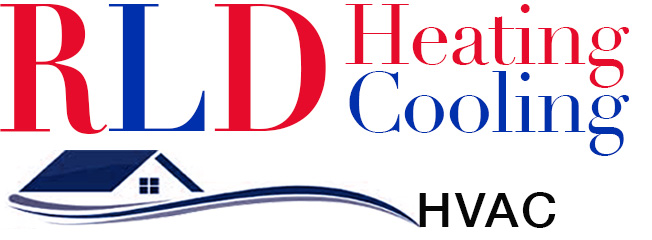Furnace vs. Water Heater in Los Angeles- Which system should you invest in?
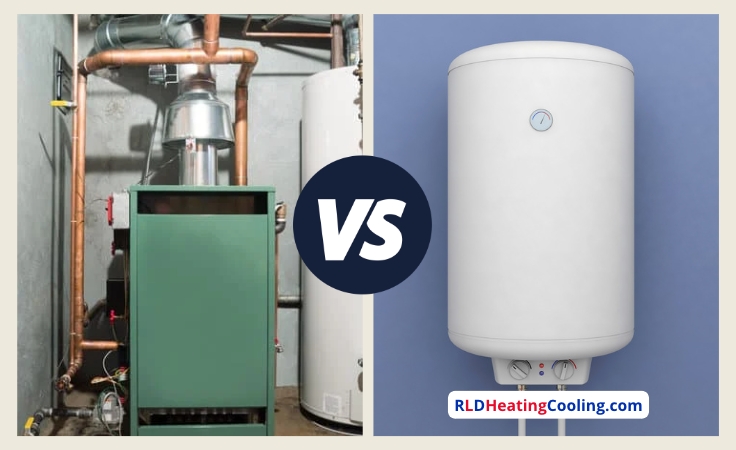
Once autumn hits and the temperature starts to drop, a lot of people want to have a warm, cozy house without any hassle.
But what if your heating system stops working all of a sudden? Do you have a reliable furnace repair company you can call on?
Isn’t that the biggest nightmare, given that the outside temperature is frigid?
Well, you can go for gas furnace repairs and maintenance.
However, if your system has become old, it is better to get a new one beforehand.
So, if you need clarification about whether a furnace or a water heater is a better option, this blog is here to help you.
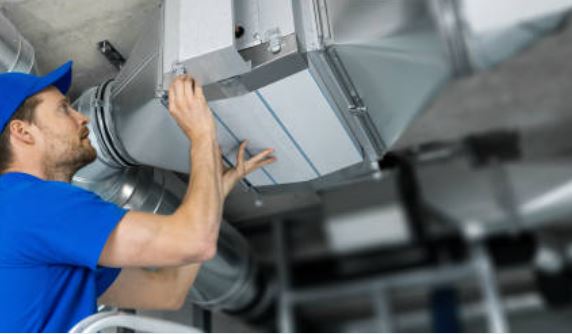
call 818-210-6669
Contact us 24/7 for your HVAC needs
In this blog, we will talk about the following:
- The system’s functionality
- Pros and cons of both systems
- Differences between the two systems
- Similarities and more.
How does a Furnace work?
A forced-air furnace that uses gas or propane is ignited through an electric ignition switch or a pilot light.
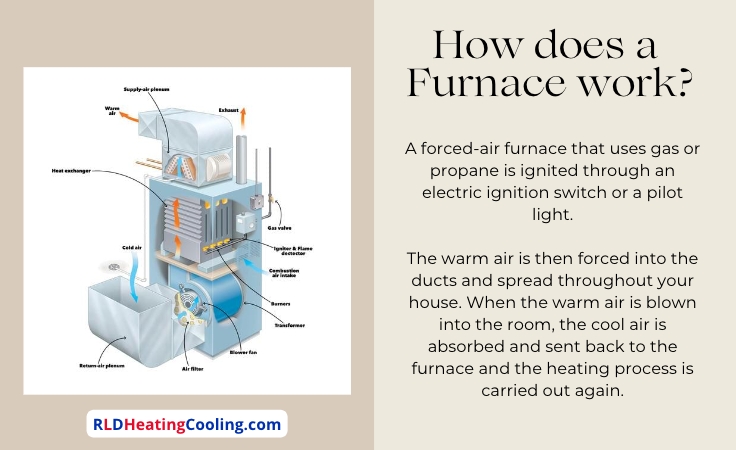
Turning the temperature on your thermostat or triggering your forced air furnace to turn on will ignite the burners, thereby heating the heat exchanger.
The warm air is then forced into the ducts and spread throughout your house. When warm air is blown into the room, the cool air is absorbed and sent back to the furnace, and the heating process is repeated.
Electric furnaces work similarly, except that the air is heated by electric coils instead of a flame.
Also, you have to get a professional to install the system for you and search for furnace companies near me.
You only need to pair it with any air conditioner and cover the system during winter.
Pros and Cons of a Furnace
The pros of a furnace are:
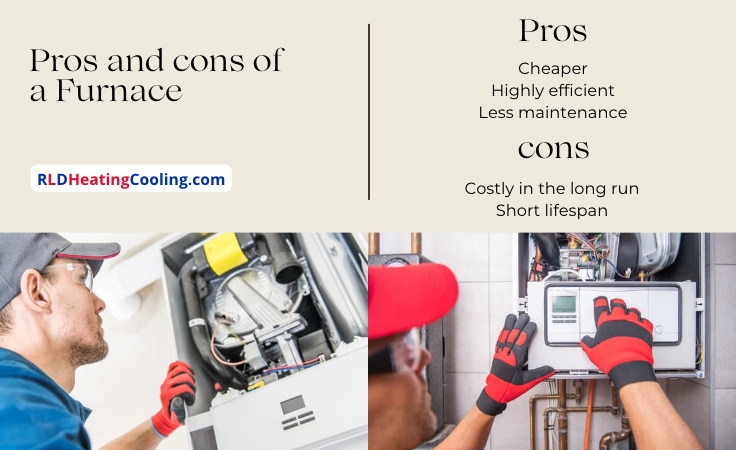
- Cheaper: Furnace installation is more cost-effective and has a longer lifespan. Although furnaces have a higher operating cost, they offer a long lifespan and are relatively inexpensive to install.
- Highly efficient: Furnaces are super efficient in heating your home, no matter what the temperature is outside.
- Less maintenance: Unlike heat pumps, furnaces require less maintenance and heating repair. The reason is that a heat pump can be used as both a heating and cooling system, whereas a furnace can only be used for heating purposes.
The cons of a furnace are:
- Costly in the long run: Furnaces are costly to operate in the long run, especially if you’re using an electric furnace. Electric furnaces use a lot of energy and can increase your energy costs significantly.
- Short lifespan: Gas furnaces have a shorter life than electric furnaces, as they need regular maintenance. However, better maintenance and cleaning of your HVAC systems does so much more in prolonging their lifespan.
- Gas furnaces are risky: Gas furnaces emit carbon monoxide and other harmful gases while operating. It can pose a risk of fire, explosions and gas poisoning.
How does a Water Heater work?
The functionality of a water heater depends on the fuel it uses. The burner is ignited to heat the water if the heater uses natural gas or propane.
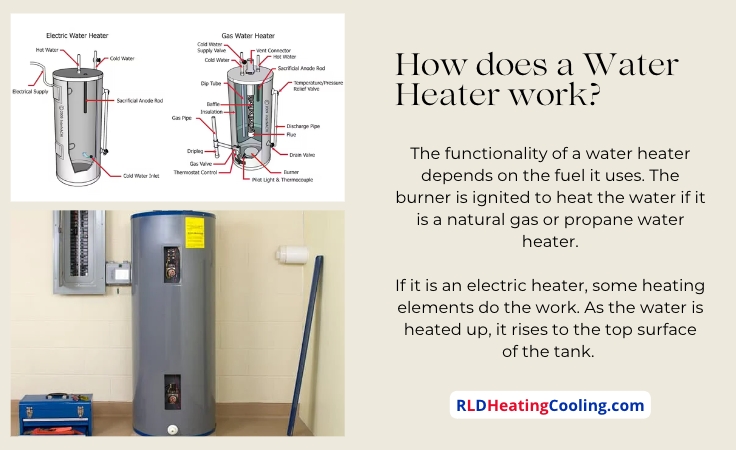
If it is an electric heater, some heating elements do the work. As the water is heated up, it rises to the top surface of the tank.
In the case of standard water heaters, the water is heated continuously, so it is readily available whenever you need it. On the contrary, the tankless water heater can provide hot water on demand. Instead of heating the water constantly, it heats the water as needed.
In water heaters, the delivery of water is dependent on your house’s plumbing system, including dishwashers, showers, sinks, washing machines, etc.
So, water heaters don’t heat your home and only heat water.
Pros and Cons of Water Heaters
Here are some of the perks of having water heaters:
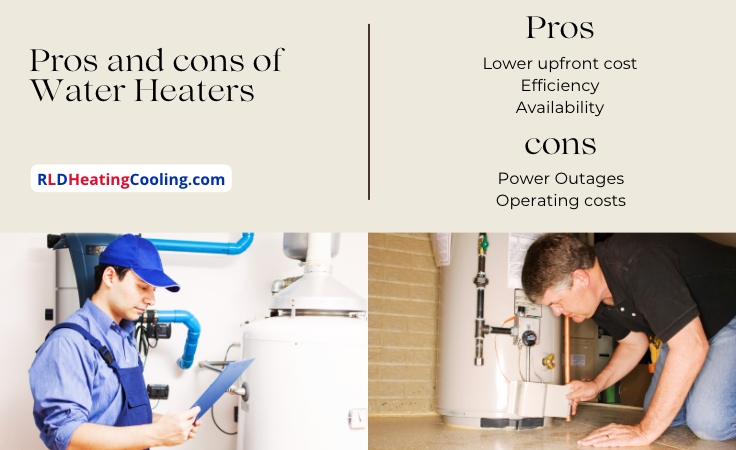
- Lower upfront cost: The upfront unit cost of water heaters is approximately $500 to $800. On the contrary, the cost of a natural gas furnace is $700- $6200, an electric furnace is $600-$2700, and an oil furnace is $1800 – $3200.
- Efficiency: The most effective way to measure the efficiency of various water heaters is to examine their respective energy factors. The number evaluates the heater’s efficiency in producing hot water. It also measures the quantity of fuel used to create the heated water. The higher the efficiency, the higher the heating capacity.
- Safe: Both electric and gas heaters are safe solutions for heating water. Gas water heaters are prone to leaks when running on propane or natural gas. However, you can reduce these risks through proper and regular maintenance.
- Availability: Most homes have an electric grid, and therefore, all have readily available electricity sources.
Some of the disadvantages are:
- Heating time and recovery rates: Do you also have to wait for your shower water to heat up, and do you think an electric heater will solve your problem? An electric heater takes more time than a gas water heater to heat the water. The reason is that gasoline combustion generates heat swiftly.
- Power Outages: If there is a power failure or outage, you won’t have access to hot water if you own an electric water heater. However, gas water heaters can operate even if power is out.
- Operating costs: Although electric water heaters are efficient, gas furnaces’ operating costs are generally lower in the long run. And it is mainly because of the low cost of the fuel source. These days, natural gas is a more cost-effective energy source than electricity.
What is the difference between a Furnace and a Water Heater?
As mentioned earlier, water heaters are designed to heat water and are not intended for heating your house. However, furnaces can heat your entire home by warming the air.
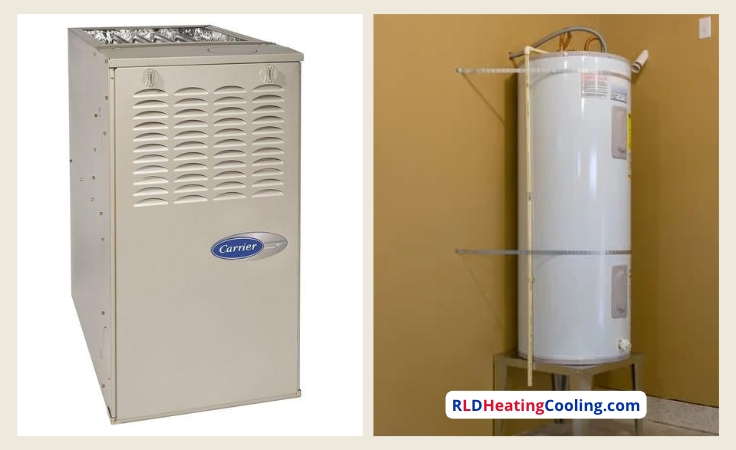
A hot water heater is available in both gas and electric forms. It’s just that the fuel source is different, but the functionality is the same.
These systems feature a tank that continuously heats water. However, tankless water heaters are also available.
Regarding furnaces, they are available in electric, natural gas and oil appliances.
It is the only similarity between furnaces and water heaters
The furnace absorbs cool air into the system, warms it, and pushes it out.
Do all heaters have a Furnace?
All furnaces are heaters, but not all heaters are furnaces.
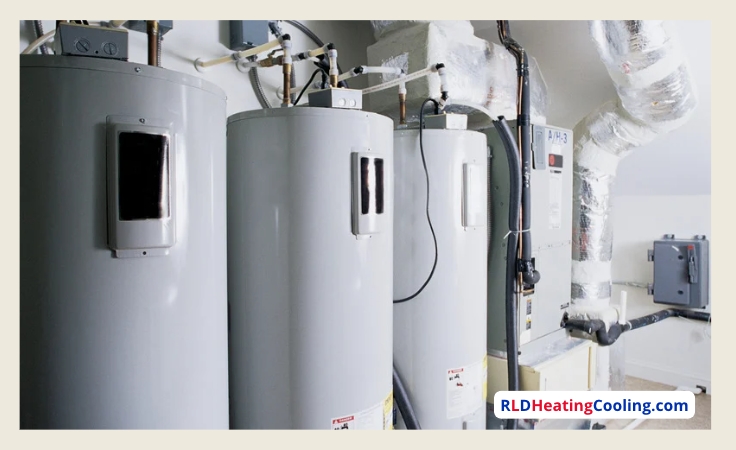
A heater is a broad term that can describe any appliance that generates heat.
Space heaters, electric blankets, boilers, and even hand warmers fall under the umbrella of heaters.
Space heaters are not connected to a furnace. However, a furnace can work in parallel to your HVAC system and a boiler.
Also, check out: Furnace vs Heat Pump if you are looking to upgrade your house’s heating system
Are Water Heaters and Furnaces connected?
Yes, water heaters and furnaces can be connected in some instances.
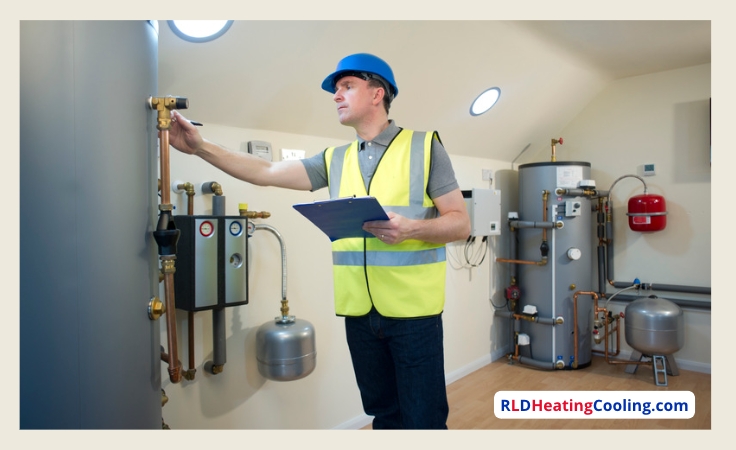
For instance, in an immersed coil installation, your water heater may have a coil-based heat exchanger that is heated with the assistance of a furnace.
Is the gas Water Heater connected to a Furnace?
If you own a gas water heater or a gas furnace, the appliance must have an exhaust vent that helps the combustion gases escape.
Such combustion is generally standard for furnaces with an efficiency of around 80%. (1)
Do you need a Furnace to Heat Water?
Some water heaters don’t have direct heating access in the water tank.
So they use heat from the furnace (or a boiler), and the tank is connected to it via a pipe.
Such systems require a furnace to heat the water, but most water heaters operate independently, as they have their own heating mechanisms.
Do HVAC systems use water?
Typically, an HVAC system doesn’t use water. An HVAC system is a combination of an air conditioner (AC) and a furnace.
An AC needs refrigerant and air, while a furnace needs gas and air.
However, some hydronic HVAC systems do not heat or cool air directly, as they use water as a heat exchange medium.
These systems offer significant advantages like:
- The piping of these systems requires less space than typical air ducts.
- Pumping water to the upper floors is more accessible than blowing air vertically.
- The system doesn’t have air ducts, so there is no risk of degrading indoor air quality.
Furnace vs. Water Heater- the better choice?
So there we are, sliding into the last part of the blog. The difference between the two appliances is quite substantial.
Furnaces heat your entire house by circulating heated air through the ducts that comprise the central heating system.
On the contrary, water heaters provide hot water that we can use for showers, dishwashing, washing machines and other appliances. In simple terms, water heaters don’t heat our houses using hot water (boilers do that). And that’s the primary reason why people confuse these devices with each other.
You may also want to check out: Types of central air conditioners.
Heating and HVAC services at RLD Services

Looking for a heating and HVAC company to solve your heating needs? Well! RLD heating and cooling services are here to help you out.
We are one of the best HVAC companies in Los Angeles. Our services include HVAC installation in Los Angeles, repair, replacement and maintenance.
We are a team of trained and qualified technicians who pledge to solve all your HVAC-related problems. Call to book an appointment.
FAQs
Here are some of the questions people usually ask:
Furnace vs. Water Heater FAQ #1: Are the Furnace and Water Heater the same?
No, a furnace and a water heater are not the same thing.
The actual and fundamental difference between the two systems is that a water heater can only give you hot water, while a furnace can heat your house by warming the air inside.
Furnace vs. Water Heater FAQ #2: What is the difference between a Heater and a Furnace?
The central heating system of your house is responsible for distributing warm air throughout your house. It also ensures that all the rooms of your house are evenly heated and comfortable.
The furnace is the system that heats the air, which is then distributed to your house.
Furnace vs. Water Heater FAQ #3: Does furnace mean Water Heater?
The furnace does the job of heating your house, but it doesn’t use water to do so.
Instead, furnaces heat the air and then spread the heated air throughout your house using a series of ducts.
Furnace vs. Water Heater FAQ #4: What’s the difference between a Furnace and a hot water tank?
The main point of difference between a furnace and a water heater is that a furnace is part of an HVAC system. On the contrary, a water heater is a plumbing system.
A furnace heats your house, whereas a water heater heats water and pumps it through pipes for showering or dishwashing.
Sources:
- https://www.energy.gov/energysaver/furnaces-and-boilers
